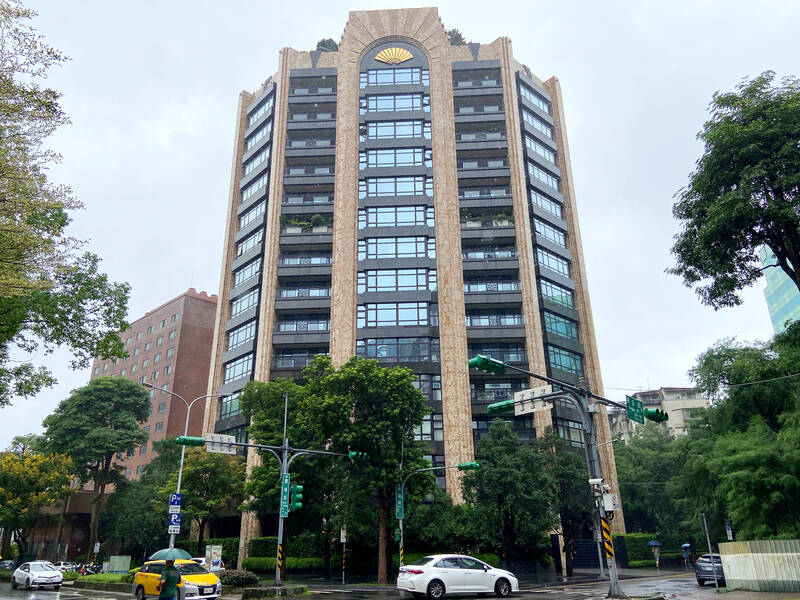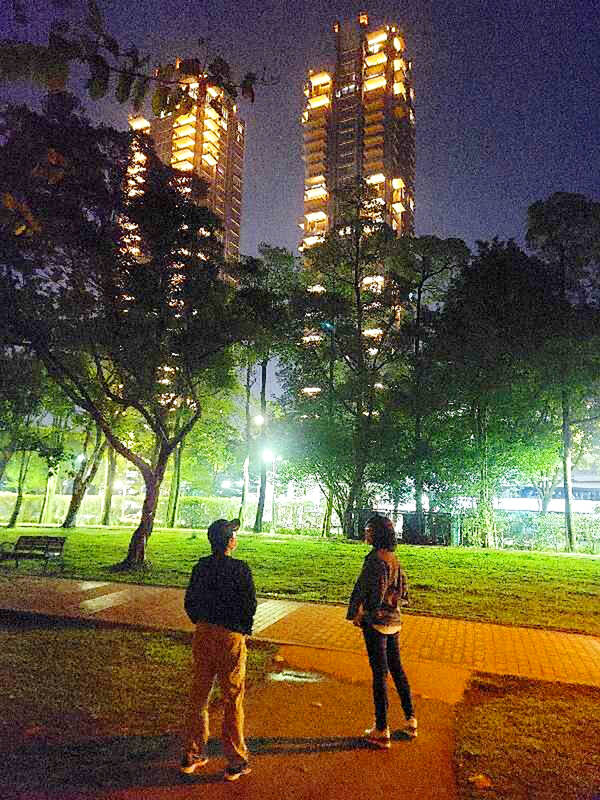It is often thought that government housing policy has been aimed at fostering widespread home ownership, but as University of Wyoming academic Chen Yi-ling (陳怡伶) points out in a superb analysis of house prices and public policy in the March 2020 edition of the journal Housing Policy Debate: “It would be more apt to describe the Taiwan case as a laissez-faire situation: people had no choice but to solve their housing problems themselves due to the lack of government assistance.”
The issue of housing and house prices has been an important one in the current presidential and legislative election campaign. In Rex How’s (郝明義) Taiwan Unbound: A New Chapter, an excellent and timely study of domestic issues and the candidates themselves, How observes that the vast majority of Taiwanese own at least one house (Chen above cites 2017 Construction and Planning Agency figures showing that home ownership reaches 84.3 percent), the “housing crisis” is in many respects a “crisis” of people not being able to find another house they can afford.
According to studies cited by Chen, over 20 percent of Taiwanese own a second home. This habit of multiple properties scales with money. Chen cites Ministry of Finance data showing that Taipei City homeowners on average own 1.67 units of housing, above the national average of 1.48 units. Chen cites another paper showing that the super rich own 4.3 units per individual (consider how many units per family that represents), while the global average for such individuals is 2.9 units. Moreover, home ownership rose even as housing prices rose during 2013-2018, Chen notes.

Photo: Su Yi-ping, Taipei Times
The shape of the housing crisis in Taiwan is thus somewhat different than what is commonly depicted. One aspect of it is the inability of young people to buy homes. A second is the inability of people who want to sell their homes and move to purchase comparable housing at a similar price. But a key aspect is the inability of people who want more homes to continue to expand their miniature real estate empires.
SHELTER FROM TAXES
In a paper for European Economic Letters last year, Yao Ming-hung (姚名鴻), an academic in the Department of Public Finance and Taxation at National Kaohsiung University of Technology, and Lai Tz-rung argue that because the taxable value of residential real estate value is underestimated, “those who hold multiple sets of real estate do not have to bear the high cost of holding real estate.” In other words, housing tax policy (or the historical lack thereof) has acted as a passive subsidy for the wealthy.

Photo: File
The low tax assessment on homes, they observe, drives the low real estate ownership costs. This means that “houses are now the preferred investment tool for most Taiwanese.” Remarking on the financialization of the housing market, Chen similarly notes: “In fact, wealth in Taiwan is increasingly reliant on capital gains from the housing market rather than real production.”
Look around you: all those construction companies churning out new apartments are not building shelters for families, but shelters from taxes.
From this perspective, social housing looks like an indirect subsidy for the rich. If the provision of housing causes residential housing prices to fall, the major beneficiaries will be the people most able to snap up cheaper homes: people who already own assets they can mortgage. Most people in social housing will remain there, unable to move out because prices will still be too high for them.
The high housing prices have many deleterious effects on Taiwan, in addition to discouraging the young. They also reduce Taiwan’s economic growth. A 2019 paper in the Journal of the Asia Pacific Economy demonstrates that high home prices in Taiwan “crowd out” consumption, reducing economic growth. Chen observes: “since 2011, median mortgage payments have accounted for more than 30 percent of median household income in Taiwan.”
Taiwanese save too much, as numerous studies document. Chen observes that because of this, banks are forced to offer lower mortgage rates to attract lenders, suppressing interest rates and reducing their return on assets.
In 2014 the government began studying an income tax on house sales based on their real value. It was finally implemented in 2016. It has had, as Yao and Lai describe above, little immediate effect on the housing market, for two reasons. First, it only applies to real estate acquired after that year. Second, the land tax and assessed value were not changed, meaning that the discrepancy between the tax value of the house and its actual value remained. Ownership costs thus remained low.
The consequences, Yao and Lai argue, are clear. In a market with low interest rates, easy access to capital and taxes only on transactions, people with multiple houses are less likely to sell houses. This limits the flow of houses to the market, sustaining high prices.
INCOME INEQUALITY
The rising income inequality in Taiwan, How points out, is characterized in Ministry of Finance figures showing that in recent years, only the top 1 percent have seen significant income growth. Therefore, he observes, the wealth inequality issue is “a contrast between the extremely wealthy top 1 percent — or rather, 0.1 percent — and everyone else.” Those wealthy are massively invested in real estate.
How also highlights another driver of high housing prices that is often missed in public discussions: local government land speculation inflates prices. First, local governments sell plots in prime urban areas through public auctions. Once a new record price is set, it “anchors” higher prices in the area. Second, they designate new zones for urban development. Once land in such zones sells at higher prices, it similarly anchors higher prices in the area.
Why do local governments do this? Because they are broke. Why are they broke? Because they cannot effectively collect taxes on local real estate holders. The assessed value of real estate remains too low.
There is no question Taiwan needs more housing, and more buildings to replace the thousands upon thousands from the housing boom of the 50s and 60s that are now aging firetraps. The major parties all agree social housing provision is an important issue.
Yet, the social housing issue appears to have wide political establishment approval because, by refocusing public attention on the provision of housing rather than taxes, it hides the problem at the heart of Taiwan’s housing prices, local fiscal poverty, slow economic growth and rising wealth concentration: the assessed value of real estate is too low.
Chen observes that the much touted land reform of the 1950s applied only to agricultural land in Taiwan. Urban land has never undergone land reform.
It’s time.
Notes from Central Taiwan is a column written by long-term resident Michael Turton, who provides incisive commentary informed by three decades of living in and writing about his adoptive country. The views expressed here are his own.

On April 26, The Lancet published a letter from two doctors at Taichung-based China Medical University Hospital (CMUH) warning that “Taiwan’s Health Care System is on the Brink of Collapse.” The authors said that “Years of policy inaction and mismanagement of resources have led to the National Health Insurance system operating under unsustainable conditions.” The pushback was immediate. Errors in the paper were quickly identified and publicized, to discredit the authors (the hospital apologized). CNA reported that CMUH said the letter described Taiwan in 2021 as having 62 nurses per 10,000 people, when the correct number was 78 nurses per 10,000

As we live longer, our risk of cognitive impairment is increasing. How can we delay the onset of symptoms? Do we have to give up every indulgence or can small changes make a difference? We asked neurologists for tips on how to keep our brains healthy for life. TAKE CARE OF YOUR HEALTH “All of the sensible things that apply to bodily health apply to brain health,” says Suzanne O’Sullivan, a consultant in neurology at the National Hospital for Neurology and Neurosurgery in London, and the author of The Age of Diagnosis. “When you’re 20, you can get away with absolute

May 5 to May 11 What started out as friction between Taiwanese students at Taichung First High School and a Japanese head cook escalated dramatically over the first two weeks of May 1927. It began on April 30 when the cook’s wife knew that lotus starch used in that night’s dinner had rat feces in it, but failed to inform staff until the meal was already prepared. The students believed that her silence was intentional, and filed a complaint. The school’s Japanese administrators sided with the cook’s family, dismissing the students as troublemakers and clamping down on their freedoms — with

As Donald Trump’s executive order in March led to the shuttering of Voice of America (VOA) — the global broadcaster whose roots date back to the fight against Nazi propaganda — he quickly attracted support from figures not used to aligning themselves with any US administration. Trump had ordered the US Agency for Global Media, the federal agency that funds VOA and other groups promoting independent journalism overseas, to be “eliminated to the maximum extent consistent with applicable law.” The decision suddenly halted programming in 49 languages to more than 425 million people. In Moscow, Margarita Simonyan, the hardline editor-in-chief of the